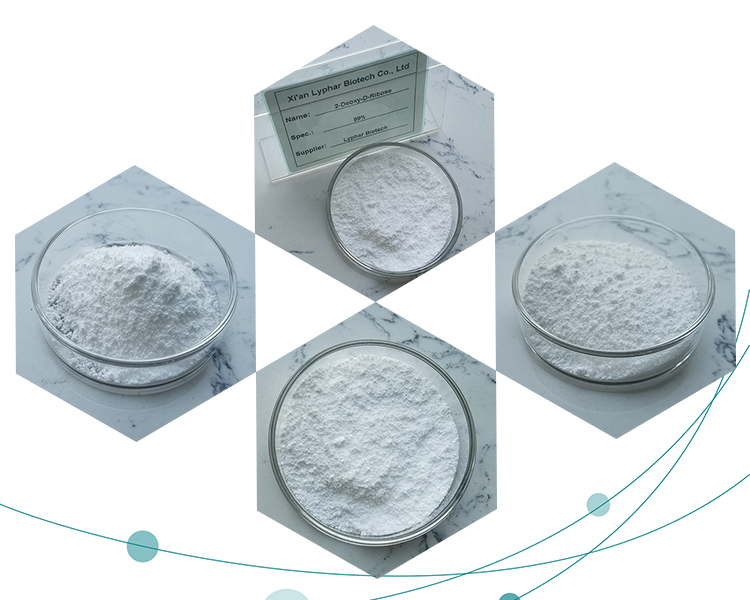Metabolic pathway of 2-Deoxy-D-Ribose, a deoxy sugar derived from ribose, primarily involves its catabolism and utilization in nucleotide synthesis. It plays a crucial role as a component of deoxyribonucleotides (dNTPs), which are essential for DNA synthesis and repair.
Metabolic Pathway of 2-Deoxy-D-Ribose:
1. Phosphorylation of 2-Deoxy-D-Ribose
- 2-Deoxy-D-Ribose is phosphorylated by the enzyme deoxyribokinase (EC 2.7.1.110) to form 2-Deoxy-D-Ribose-5-Phosphate.
- Reaction:
2-Deoxy-D-Ribose+ATP→2-Deoxy-D-Ribose-5-Phosphate+ADP
2. Cleavage via the Pentose Phosphate Pathway (PPP)
- Deoxy-D-Ribose-5-Phosphate undergoes cleavage by phosphodeoxyriboaldolase (EC 4.1.2.4) into:
- D-glyceraldehyde-3-phosphate (G3P) (enters glycolysis)
- Acetaldehyde (converted into acetate or ethanol in certain organisms)
Reaction:
2-Deoxy-D-Ribose-5-Phosphate→D-Glyceraldehyde-3-Phosphate+Acetaldehyde

3. Entry into Central Metabolism
Glyceraldehyde-3-Phosphate enters glycolysis, leading to ATP production.
Acetaldehyde can be further metabolized to:
- Acetate (via aldehyde dehydrogenase) for energy generation.
- Ethanol (via alcohol dehydrogenase in anaerobic organisms).
4. Alternative Pathway: Nucleotide Synthesis
- 2-Deoxy-D-Ribose can also be incorporated into nucleotide synthesis via salvage pathways.
- Deoxyribonucleotide synthesis: It contributes to deoxyribose moieties in deoxyribonucleotides (dNTPs) used for DNA replication and repair.
Key Enzymes Involved:
- Deoxyribokinase (EC 2.7.1.110) – phosphorylates 2-Deoxy-D-Ribose.
- Phosphodeoxyriboaldolase (EC 4.1.2.4) – cleaves Deoxy-Ribose-5-Phosphate into glycolytic intermediates.
- Aldehyde dehydrogenase (EC 1.2.1.3) – oxidizes acetaldehyde to acetate.
- Alcohol dehydrogenase (EC 1.1.1.1) – converts acetaldehyde to ethanol (in fermentative organisms).

Biological Significance
- DNA metabolism: As a precursor for deoxyribonucleotides.
- Energy production: Via glycolytic and oxidative pathways.
- Salvage Pathway: Helps in nucleotide recycling, conserving metabolic energy.
Would you like a diagram to illustrate this pathway?
